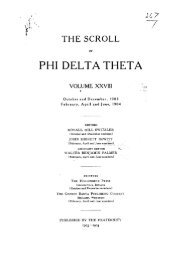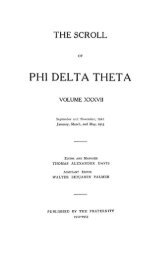1993 Volume 116 No 1–4 - Phi Delta Theta Scroll Archive
1993 Volume 116 No 1–4 - Phi Delta Theta Scroll Archive
1993 Volume 116 No 1–4 - Phi Delta Theta Scroll Archive
Create successful ePaper yourself
Turn your PDF publications into a flip-book with our unique Google optimized e-Paper software.
his medical career fighting AIDS, but he doesn't see himself as a<br />
hero. An energetic and committed physician, Volberding plays<br />
the roles of researcher, politician, advocate, and doctor as the director<br />
of the Center for AIDS research at the University of California<br />
at San Francisco. He is also chief of clinical oncology and<br />
the head of the AIDS program<br />
According to the CDC, one<br />
million Americans are HIV<br />
positive, and more than<br />
180,000 have died of AIDS.<br />
at San Francisco General Hospital,<br />
a program he started in<br />
1983. His wife. Dr. MoUy<br />
Cooke, is also an academic<br />
physician who works in San<br />
Francisco's AIDS ward.<br />
A trained specialist in retroviruses<br />
(of which HIV is one), Volberding saw his fiiture as a<br />
cUnician in fighting cancer. He admired the courage and outspokenness<br />
of cancer patients, the same traits that drew him to<br />
people with AIDS.<br />
In the early '80s, when Uttie was known about the epidemic,<br />
Volberding became somewhat of a media superstar because of his<br />
calm, reassuring style and his rare expertise on the disease. He<br />
gained instant popularity among the gay community as a patientadvocate,<br />
and even now is somewhat of a Uving legend in the<br />
AIDS community. He has appeared on "Nightiine," "Donahue,"<br />
and "Merv Griffin." In 1987, the editors of GQ_magazine gave<br />
him their GlenUvet Award for Singular Style. His exploits, and<br />
those of the few other physicians who addressed the epidemic in<br />
the early '80s, have been chronicled in And the Band Played On,<br />
the classic book by San Francisco Chronicle reporter Randy ShUts.<br />
As the new chief of oncology at San Francisco General in<br />
1981, Dr. Volberding responded to the epidemic when few others<br />
would. He established the first center that aUowed patients to<br />
help shape their own treatment; he argued vigorously on the side<br />
of patient rights; and he has chaired or served on nearly every<br />
major national and international policy-making committee on<br />
AIDS. Volberding's Ward 5B was the first inpatient unit in the<br />
U.S. devoted exclusively to AIDS patients.<br />
"What we've done here is put together a great program for<br />
patients. It just makes more sense with this disease to work with<br />
patients to develop systems of care instead of trying to impose<br />
existing systems on this new disease," says Volberding.<br />
"We've developed programs that are used throughout the<br />
world as models [for AIDS care] that are very good medicine and<br />
are also cost effective."<br />
Being at the center of the political storm AIDS has created,<br />
Volberding has become respected and admired not only as a doctor<br />
and researcher, but as a politician. Despite the fact that the<br />
epidemic has created discord between patients, pharmaceutical<br />
companies, physicians, and the government, Volberding has the<br />
uncanny abiUty to build coalitions and sooth conflicts. The more<br />
heated debate regarding the Federal drug approval process provokes<br />
only a calm, uncritical response.<br />
"I may be in the minority, but I think the FDA has done a<br />
great job," he says. "It took them, like the rest of the medical<br />
community, a while to get up to speed on this disease, but it also<br />
took the drug companies some time to develop some promising<br />
drugs.<br />
218 TheScroU<br />
"One area we are watching is the flexibUity of the approval.<br />
GeneraUy, when the FDA approves a drug, they approve it for a<br />
specific disease and for one group of people. With HIV, we<br />
would Uke them to keep an open mind to giving approval for a<br />
broader group of HIV infected people."<br />
In 1983, Volberding became<br />
involved with some of the earliest<br />
cUnical tests of AZT, culminating<br />
in his leading the largest cUnical<br />
trial on HIV infection. His skiU at<br />
understanding aU sides of this political<br />
issue has opened many<br />
doors for him and his program.<br />
Volberding now uses much of his influence lobbying pharmaceutical<br />
companies to test their new drugs at his center.<br />
Volberding's high profile work on AIDS led international<br />
AIDS organizations to recruit him. He became a founding member<br />
of the International AIDS Society, serving as its president<br />
from 1990 - 92.<br />
Volberding is increasingly concerned with the AIDS crisis in<br />
third world nations. Eighty percent of new AIDS cases occur in<br />
these countires, and with few health care workers and budgetary<br />
constraints, these countries cannot afford to distribute condoms,<br />
nor can they afford drug therapy.<br />
"A vaccine is the major push, because there are many developing<br />
countries where HIV infection is spreading absolutely<br />
without control. Many of those countries have no health care<br />
AIDS education at Michigan Epsilon<br />
Until a cure is found, education<br />
is the only weapon<br />
against AIDS.The Michigan<br />
Epsilon chapter took this<br />
to heart last January,<br />
sponsoring a seminar on<br />
AIDS and HIV.<br />
The members organized<br />
and promoted the<br />
seminar for all Greeks at<br />
<strong>No</strong>rthwood University.<br />
Getting the facts: <strong>No</strong>rthwood <strong>Phi</strong>s<br />
after the seminar.<br />
Two volunteers for the local Red Cross, Marty HoUenbeck, director<br />
of health and safety education, and "John Myers," an AIDS<br />
patient, presented the facts and the realities of the disease.<br />
"We gave them the facts and then applied them to real life<br />
situations," said HoUenbeck.<br />
The presenters emphasized abstinence, but they also discussed<br />
ways to protect against infection resulting from sexual<br />
activity.They carefully avoided stereotyping victims of AIDS.<br />
"People often build barriers to convince themselves that<br />
AIDS happens to someone else," HoUenbeck said."That way,<br />
they feel safe."<br />
After the presentation, the brothers passed out condoms to<br />
the group."Let's face it these are scary times," said Brother Brad<br />
Pelachyk, the event's principal organizer. "We need to be well<br />
informed and act responsibly."

















